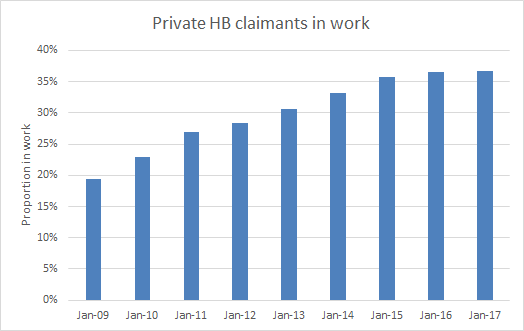Housing benefit freezes are putting renters at risk of homelessness. Shelter’s new campaign is calling on the government to pledge more help in the Autumn Budget by re-linking Local Housing Allowance to actual rents.
Private renters are now enduring the seventh consecutive year of cuts to housing benefit. At Shelter we’re only too well aware of the impact this has had on people’s ability to find and keep a home.
It’s no coincidence that homelessness triggered by the loss of a private rented tenancy began rising almost as soon as the housing benefit cuts took effect. Before the housing benefit cuts began in April 2011, 15 per cent of households who were accepted as statutorily homeless had lost their previous home because of the end of a tenancy. By early 2016 – as the government prepared to freeze local housing allowance until 2020 – that proportion had risen to just under a third.
Now, the Local Government Association has added its voice to the chorus of people warning the government that the ongoing squeeze on private renters is untenable.
Amid credible warnings of collapsing affordability and rising homelessness, the DWP’s response frustratingly misses the point. A spokesperson dismissed the latest findings for not taking into account people’s ability to move into work.
What this supposed solution ignores is the substantial increase in people in work who still need housing benefit, due to high housing costs and low wages. The number of working households claiming housing benefit in the private rented sector has more than doubled since 2009.
 DWP caseload data shows that only seven per cent of private renters claiming housing benefit are actually classed as job seekers. The rest are either already employed or currently unable to work. The ability of people to earn their way out of the impact of LHA changes is limited. And that’s before you take into account the impact of housing benefit (or Universal Credit) tapers – the way in which benefits are calculated mean that the majority of any increased earnings are lost in withdrawn benefits.
DWP caseload data shows that only seven per cent of private renters claiming housing benefit are actually classed as job seekers. The rest are either already employed or currently unable to work. The ability of people to earn their way out of the impact of LHA changes is limited. And that’s before you take into account the impact of housing benefit (or Universal Credit) tapers – the way in which benefits are calculated mean that the majority of any increased earnings are lost in withdrawn benefits.
Local Housing Allowance rates (which are used to determine the maximum amount of support a private renter can receive) will not be increased until 2020. The Local Government Association commissioned new analysis by Policy in Practice that warns this will amount to an average loss for private tenants of £38.40 a week by the end of the decade.
The implications for local government are stark. The authors concluded that “rising rents, without an increase in housing support, will lead more people to approach local government for help, driving up temporary accommodation and homelessness support costs.”
It’s a risk that we’ve been warning of for a while. Shelter analysed the impact of freezing local housing allowance and it creates a bleak picture for renters across England. By 2020, in the overwhelming majority (83%) of local areas, the amount of housing benefit available to private renters won’t even cover the cheapest rents locally. In over a third of areas, renters will have to cover shortfalls in excess of £100 a month.
We know from our services that this situation isn’t tenable and is pushing people into homelessness. That’s why we’re calling on the government to end the freeze and up-rate Local Housing Allowance to reflect actual rents in this autumn’s Budget.
The government accepted in its housing white paper that the housing market is broken. This was incredibly welcome but Ministers are yet to face up to the implications of this. Working and low income households need help now to cope with the impact of high rents and cannot be left to bear the cost alone of years of government failure.
Increasingly people are finding that work is no protection against unaffordable housing or homelessness. There are no formal measures of how many homeless households are in work but recent Shelter analysis of housing benefit statistics suggest that a third of households in temporary accommodation are in work, rising to half in London. But unaffordable housing costs mean they are unable to house themselves and are forced to rely on their local council for assistance.
This Autumn’s Budget gives the government the opportunity to step in and prevent further increases to homelessness by ensuring that housing benefit is fit for purpose.
If you agree please stand up for renters and tell the government to take action.
